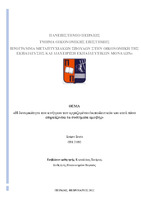Η δυναμικότητα των κινήτρων των εργαζομένων / εκπαιδευτικών και κατά πόσο επηρεάζονται τα συστήματα αμοιβής

Προβολή/
Λέξεις κλειδιά
Κίνητρα ; Συστήματα αμοιβών ; ΠαρακίνησηΠερίληψη
Τα κίνητρα ορίζονται ως οι παράγοντες ή οι αιτίες που ενθαρρύνουν και παρωθούν το άτομο να ασχοληθεί ή να επιδιώξει την επιτυχία κάποιου στόχου του. Η παρακίνηση είναι ένας κεντρικός πυλώνας στον εργασιακό χώρο, ενώ η έννοια και ο ρόλος της έχει μελετηθεί από πολλούς ερευνητές και ακαδημαϊκούς. Αναφέρεται στη μεθοδευμένη προσπάθεια για την ανάπτυξη του ενδιαφέροντος των εργαζομένων για την εργασία τους, μέσω ηθικών και οικονομικών κινήτρων, με στόχο την αύξηση της απόδοσης τους. Η ικανοποίηση από την εργασία δεν ταυτίζεται με την παρακίνηση, αλλά σχετίζεται με αυτήν. Με βασικό κριτήριο ότι οι εκπαιδευτικοί διαδραματίζουν καθοριστικό ρόλο στην ποιότητα της εκπαίδευσης, κρίνεται απαραίτητη η διερεύνηση και η κατανόηση της ικανοποίησης από την εργασία τους καθώς επίσης και των κινήτρων τους. Τα συστήματα αμοιβών συνδυαστικά με τα κίνητρα των εκπαιδευτικών αποτελούν το κυρίως θέμα της παρούσας ερευνητικής εργασίας. Δεδομένου ότι τα κίνητρα των εκπαιδευτικών επηρεάζουν άμεσα τα κίνητρα των μαθητών τους, οι εκπαιδευτικοί με υψηλά κίνητρα είναι απαραίτητοι για ένα αποτελεσματικό εκπαιδευτικό σύστημα.
Στην παρούσα εργασία πραγματοποιήθηκε ποσοτική έρευνα μέσω διανομής ερωτηματολογίου σε ηλεκτρονική μορφή σε εκπαιδευτικούς Πρωτοβάθμιας και Δευτεροβάθμιας Εκπαίδευσης. Το σύνολο των ερωτηθέντων ήταν 100 άτομα. Στόχος της έρευνας είναι η διερεύνηση των κινήτρων των εκπαιδευτικών και ο ρόλος των συστημάτων αμοιβής. Τα αποτελέσματα έδειξαν ότι οι εκπαιδευτικοί δεν έχουν ως κύριο κίνητρο τις οικονομικές απολαβές, όμως φαίνεται ότι οι μέσες ηλικίες έχουν τις οικονομικές απολαβές ως το πιο ισχυρό κίνητρο για τη συνέχιση της άσκησης του επαγγέλματος. Σημαντικές φαίνεται να είναι και οι παράμετροι των άλλων τύπων παροχών, όπως η συνταξιοδότηση και οι παροχές μητρότητας. Τέλος, τα πιο ισχυρά κίνητρα φαίνεται να σχετίζονται με τη φύση του επαγγέλματος (σχέση με μαθητές, μετάδοση γνώσεων και αξιών) και τις συνθήκες εργασίας (λήψη πρωτοβουλιών).
Συμπερασματικά, φαίνεται ότι τα συστήματα αμοιβής καθορίζουν εν μέρει τα κίνητρα, αλλά δε φαίνεται να είναι τα κυρίαρχα στην επιλογή του επαγγέλματος, ενώ σημαντικά θεωρούνται τα στοιχεία που αφορούν τη φύση και τις συνθήκες του επαγγέλματος.

